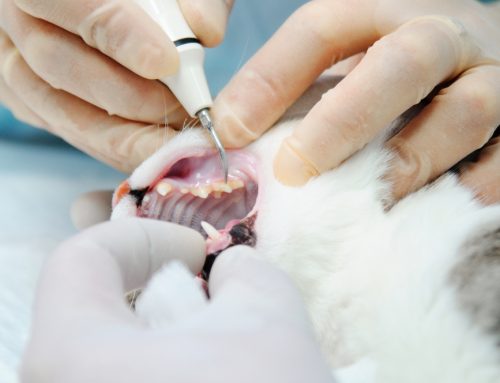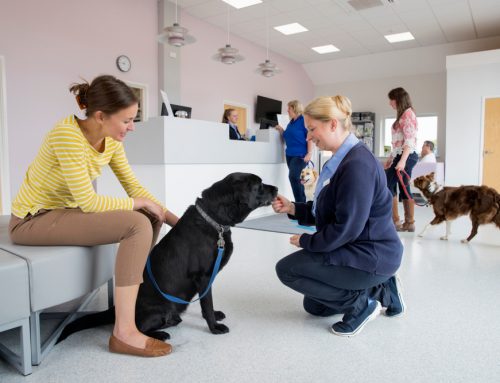When you schedule your pet’s annual wellness exam at Bolton Veterinary Hospital, you’re reminded to bring a fresh stool sample. At check-in, owners are often so eager to surrender their pet’s smelly deposit that they seldom ask why we requested, or what we do with the sample—but we know they wonder as much.
This month we’re putting your pet’s poop under the microscope—figuratively speaking—and taking a closer look at pet intestinal parasites.
Question: What is a fecal parasite screening in pets?
Answer: Fecal floatation, stool check, or intestinal parasite screening—no matter what you prefer to call it—is the number one lab test for your pet’s number two. When you bring us your pet’s sample, the complete fecal screening includes:
- Gross exam — All stool is gross, right? Fair enough, but this actually refers to any worms visible to the naked eye.
- Direct smear — A small fecal sample is applied with saline to a glass slide, and viewed microscopically for giardia cysts.
- Fecal floatation — This test looks for parasite eggs. The “float” part refers to the preparation, when the sample is mixed with a heavy sugar solution, and spun in a high-speed centrifuge, to separate the eggs from the other fecal matter. The eggs rise to the top, while other debris sinks to the bottom. The sample is then placed on a slide, and reviewed microscopically.
Q: Where did my pet get a parasite?
A: Pets do not have the most discerning taste, and partake in some smelly activities, such as rolling in or consuming feces, which are two common ways that pets are infected with parasites. Fecal-oral transmission often occurs when pets ingest or groom off feces or contaminated soil. Specific parasites can also infect pets and people through various routes, including:
- Tapeworms — Pets can get tapeworms by swallowing an infected flea while grooming.
- Roundworms — These worms are commonly transmitted from the mother to her offspring through the placenta or milk.
- Hookworms — These worms can penetrate bare skin.
- Giardia — Infectious cysts can live in fecally contaminated water or food, or on contaminated objects.
Q: What can a microscopic parasite do to pets?
A: Most intestinal parasites cause little to no harm in adult pets, but they can make puppies and kittens visibly ill. Large worm burdens can overwhelm a young animal, stunting growth, and negatively impacting their physical condition. Hookworm infections can cause anemia in small puppies and kittens.
Q: Can I get a worm from my pet?
A: Many intestinal parasites are zoonotic, meaning they can be transmitted from pets to people. People—especially children and immunocompromised populations—are commonly infected via the fecal-oral route, because of a lack of handwashing, or from handling contaminated objects or soil (e.g., gardening without gloves, eating after petting or picking up after an animal). Walking barefoot on contaminated soil is a common method for hookworm infection.
Q: What are the most common intestinal parasites in pets?
A: Two intestinal parasite categories are seen in pets. The parasites are categorized based on their structure—worm-like nematodes and cestodes, and single-celled protozoans. In general, pet owners are more familiar with intestinal worms, which include:
- Roundworms
- Hookworms
- Tapeworms
- Whipworms
Owners are less likely to recognise protozoans, but they can affect pet and human health. Protozoans are resistant to standard deworming treatments, and require specialized medication. Still, treatment can be challenging, as pets are routinely reinfected through their environment.
- Giardia
- Coccidia
Q: How will I know if my pet has worms?
A: Infected pets may not show any infection signs, making testing your pet’s stool annually or bi-annaully at Bolton Veterinary Hospital crucial. Puppies and kittens may experience vomiting, diarrhea, poor hair coat, weight loss, weakness, or a pot-bellied appearance.
Q: How are intestinal parasites treated in pets?
A: While severely affected puppies and kittens require hospitalization, most parasitic infections are managed on an outpatient basis. Treatment involves a three-pronged approach:
- Treating the pet — Depending on your pet’s parasite, you’ll receive a deworming medication to administer at home. Ensure your pet finishes the prescription as directed. Pets with tapeworms will also receive flea and tick preventives.
- Treating the environment — Pets will continue to shed infective eggs throughout their treatment, so you must remove pet waste as soon as possible, to prevent infecting other pets, or contaminating the soil. Avoid dog parks and high traffic pet areas until your pet’s fecal screening is negative. High-risk people should wear gloves while cleaning up after infected pets.
- Preventing transmission and reinfection — Wash your hands after any pet interaction, especially after removing pet waste, or before eating. If your dog is being treated for giardia, clean their hind end after defecation, to prevent reinfection.
All treatment measures should be continued until your pet’s fecal screening tests negative (i.e., they are parasite-free) at Bolton Veterinary Hospital.
Q: Can I prevent my pet from getting intestinal parasites?

A: Parasite prevention is easier than ever, but requires consistent effort. Take the following steps to protect your pet:
- Yearly or twice-yearly fecal screening tests — Remember, most parasites go unseen.
- Flea, tick, and heartworm prevention — Monthly heartworm preventives include a broad-spectrum dewormer, while flea preventives will prevent tapeworms.
- Remove pet waste — Fresh waste is less infectious, so stoop and scoop ASAP.
- Avoid contaminated areas — Keep your dog away from poorly maintained dog parks and yards, pet and animal feces, and stagnant water.
As a pet owner, you don’t really want to ever hear that your pet has intestinal parasites, but awareness about these microscopic menaces can keep you, your pet, and your family safe. To schedule your pet’s annual exam and fecal parasite screening, contact Bolton Veterinary Hospital.







Leave A Comment